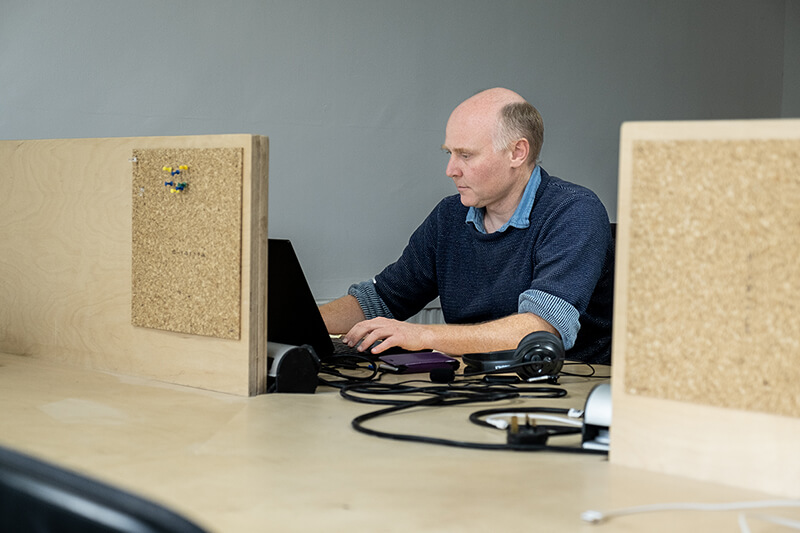In Focus with Damon Rand – CEPRO
Head of Product at Clean Energy Prospector (CEPRO), Damon Rand, is based at Easton Business Centre and we spend some time chatting to him about how his company has designed and developed the UK’s first integrated community microgrid.

How do you explain to people what you do?
We help people take the leap to installing relatively complex renewable energy systems and battery storage – partly by helping to bring finance to it.
We knew there was an opening to make a long-term return from renewable energy, but that property owners aren’t always best placed to raise the capital. So we link up investors who want to use their money for doing good with people who have the land, but not the capital.
When did you start?
The company was founded in 2009 when it was clear this would be a really big opportunity. We moved to Easton Business Centre in 2012, so have been here for 10 years now.
Tell us about your microgrids
We design and create private smart grids with large solar arrays, battery storage and renewable heating for housing developments. By applying a ‘third-party ownership’ business model, property owners get a low cost, low carbon, professionally maintained energy supply and investors can deploy capital into local infrastructure.
This increases the resilience of local communities and provides a healthy financial
return. In the case of new-build housing, it also means that zero-carbon homes can be sold at a more affordable cost.
Are these developments up and running?
Yes. We have a new-build development at Lawrence Weston where 12 houses are already occupied, which will increase to 33 in June this year. This was the UK’s first integrated community microgrid, with large-scale battery storage, solar panels, EV charging points and electric heat pumps.
We’re also finalising a development of 54 houses in Bridport, which will start being occupied from August.
Can this technology be retrofitted onto existing developments?
Yes, although it’s much more complex! We have a pioneering project underway at Easton Community Centre, which has funding from the West of England Combined Authority. We are keen to focus on decarbonising our own geography, so like a lot of Bristol, this involves an old Victorian terrace. It makes whole-home electrification far more complicated.
There’s lots of talk in the media about rising energy costs. Is this a cheaper option?
This takes energy shocks out of the system to reduce costs in the long term. The priority is more improving our resilience to uncertainty, offering more stable pricing models, and – of course – providing a clean energy option.
How did the pandemic affect your business?
We carried on working and developing throughout. It was actually a positive time for us as a business, because it gave us a glimpse of what the new world could be like. It was clear the country didn’t need coal, we didn’t need to travel as much – it opened up purse strings in a lot of places.
What’s next for CEPRO?
We want to be a big part of helping Bristol to reach zero carbon by 2030. It’s achievable, we have the technologies and the business case is good for saving money over the long term.
What can small businesses do if they want to make a difference?
We need to consider electrification in all its forms. And stop burning stuff! The payback over 7-10 years is very good.
To learn more about CEPRO visit: www.cepro.co.uk
Popular Articles
Can’t see the support you need for your business?
Talk to us, the Spaceworks team are always happy to help.
Join a community of over 200 businesses that call Spaceworks their home.


